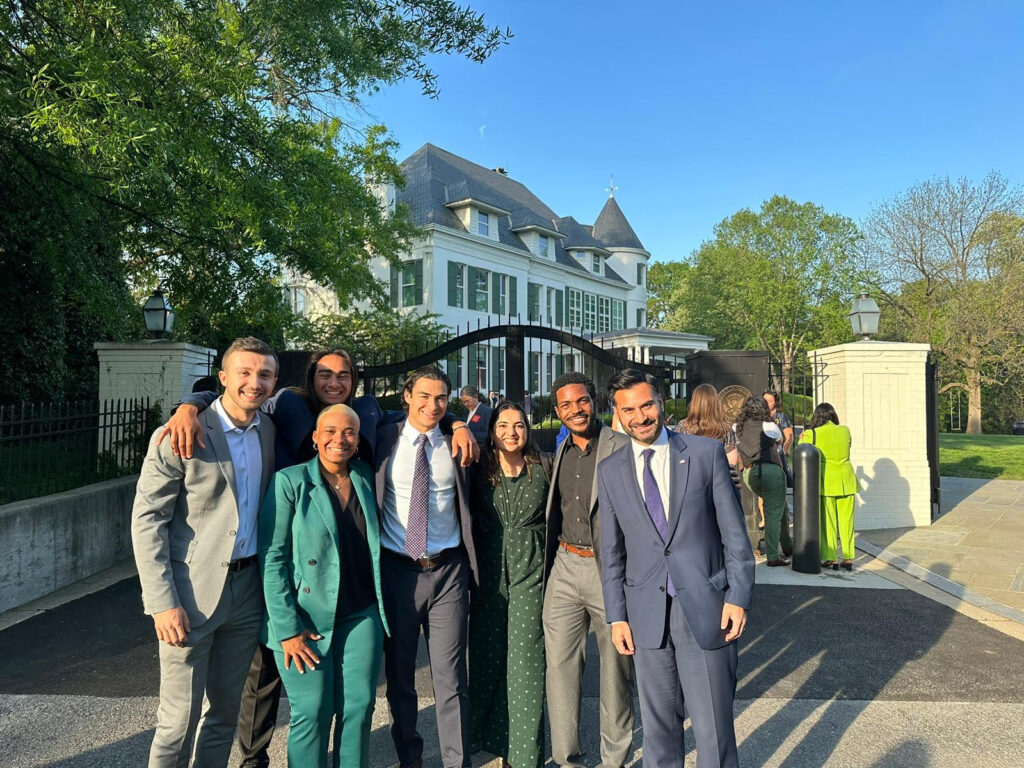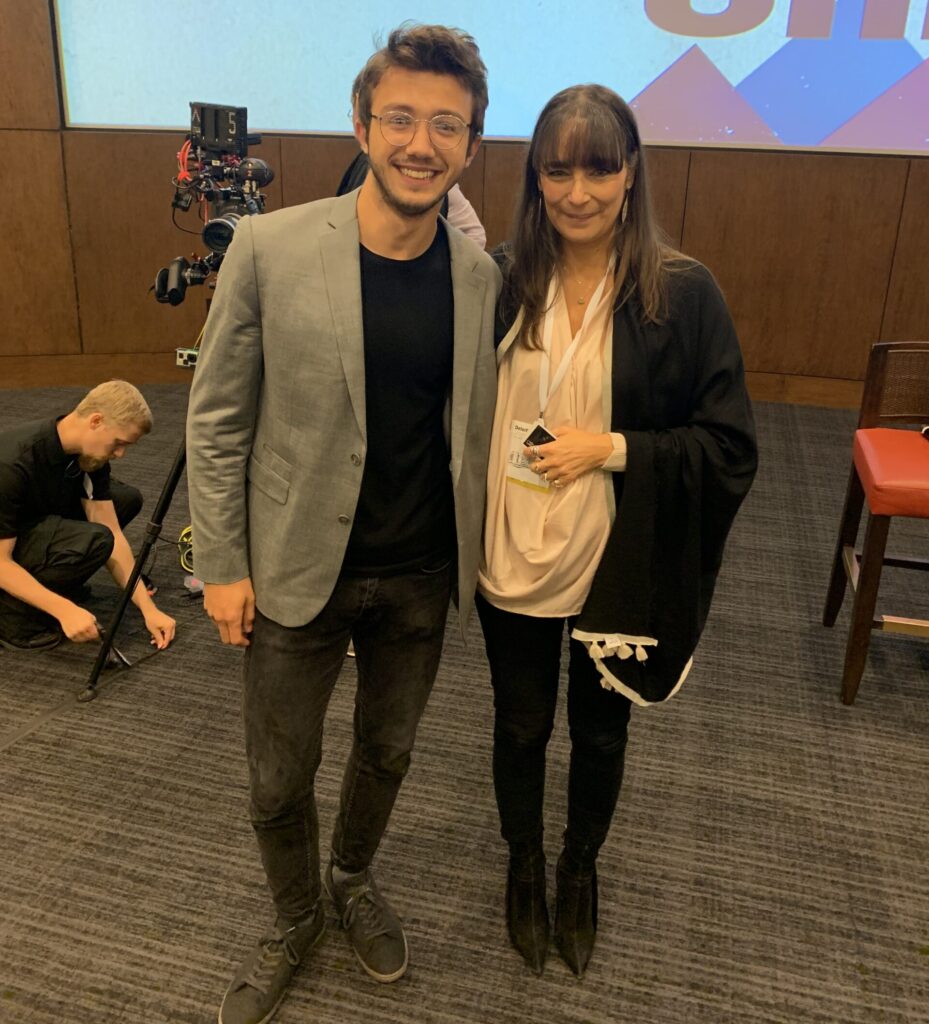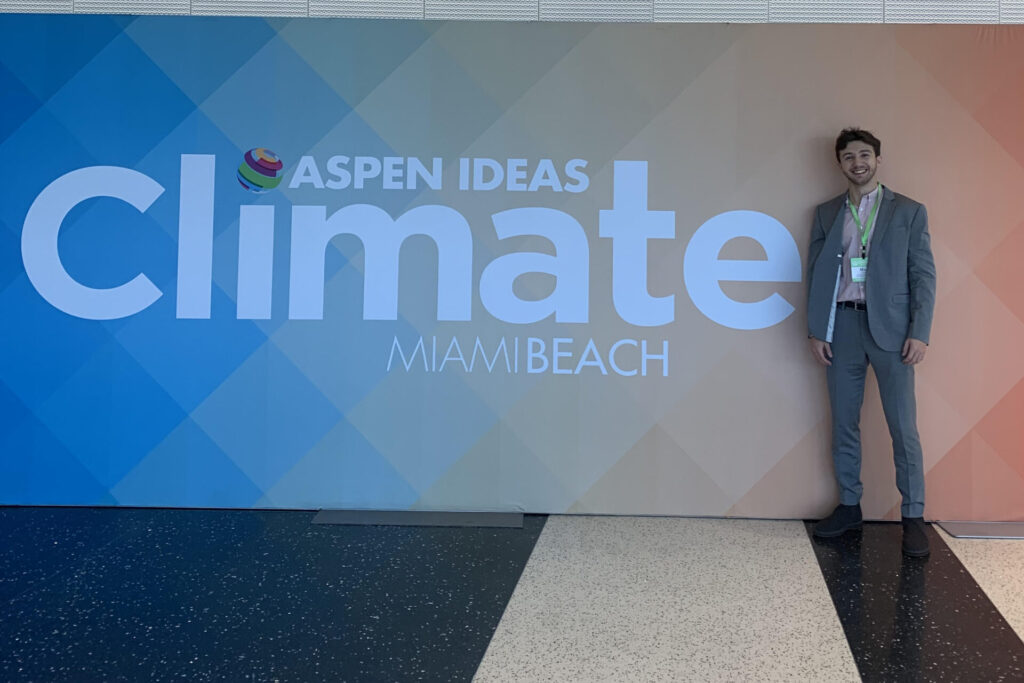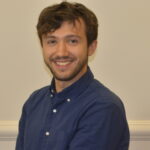
Max Sano is a talented multi-fellowship winner who participated in programs that facilitated paying for college and participation in environmental concerns. He won the Posse Scholarship, which provided him with a full-tuition scholarship and facility mentoring. He also went on to win the Udall Scholarship and Aspen Institute Future Climate Leader Fellowship, programs for emerging leaders in climate policy and environmentalism. He also received the Call for Kindness Fellowship, which provides funding for running social impact projects.
These opportunities supported his varied career in government, environmental studies, public policy, food studies, and social impact work. We recently spoke with Max to learn about his inspiring story, from his call to action living through Hurricane Sandy to his recent graduate research in food studies at NYU. He details his social impact work as the founder of The Greenzine, an environmental journalism initiative for young changemakers. Max also shares tips for aspiring fellowship applicants, activists, and young professionals.
Let’s start with your undergrad career; what interested you in pursuing government and environmental studies?
My call to action was living through Hurricane Sandy, a superstorm that devastated much of the East Coast and New York City metropolitan area. At the time, I lived in Battery Park City—an area of Lower Manhattan that was primarily built on debris from the construction of the original World Trade Center building back in the 1970s. Local parks and sidewalks I used to walk with my little brother were submerged with storm surges of up to six feet. The wind whipped up to 80 miles per hour. Just a ten-minute walk from New York’s financial capital, our apartment building (and many others) lost electricity and running water for about a week.
Earlier that year, I watched Al Gore’s An Inconvenient Truth and saw projections of New York City underwater by 2040. I didn’t think I would see parts of NYC underwater in my lifetime. This experience made me think about how governments respond to crises and the relationships between the built and natural environments.
During undergrad, you were a Posse Scholar and Udall Scholar! How did these fellowships contribute to your professional and personal development?
The Posse Foundation offers full-time tuition national leadership scholarships to cohorts of students from select cities nationwide to attend a four-year undergraduate program. One of my high school teachers nominated me in my final year of high school, and I went through a three-step interview process (nicknamed DAP or the Dynamic Assessment Process) before being accepted.
I was drawn to this program because it brought together young people from different backgrounds interested in pursuing their passions in higher education and beyond. My father never got the chance to pursue a college degree, and I would not have been able to attend Franklin & Marshall College without Posse’s financial and emotional support. Once a week, my Posse cohort would meet with staff to go through the basics of college prep (e.g., what to pack, resume writing, career pathways) and dissect the intersectionality of our identities with our goals during and after college. Through Posse, I was able to join a network of students within my college campus and at dozens of college campuses nationally.
I also learned about professional development opportunities, such as acceptance to the Thurgood Marshall Summer Law Program in partnership with the New York City Bar Association. I was paired with NY State Supreme Court Justice Hon. Andrea Masley to assist with court filings and learn about state and federal judicial systems, including opportunities at immigration and family courts, as well as the Southern District of New York. This experience solidified my interest in public service and pursuing a government degree.

Meanwhile, the Udall Foundation offers undergraduate scholarships to rising sophomores and juniors who exhibit leadership and commitment to the environment, public health, and Tribal public policy. I was selected for this award because of my experiences in climate policy research and advocacy at different levels. I went into college researching the connections between forced resettlement and climate change with Franklin & Marshall’s Environmental Migration Lab. After a year of volunteering and part-time work at the Lab, I presented our research to a local chapter of Citizens’ Climate Lobby—a community-led group of volunteers (most of whom were retirees and parents) advocating for carbon tax policy. I fell in love with their activism and felt the need to bring more young people into the fold, so I coordinated events and initiatives between different groups both on and off campus.
Around the same time, I joined F&M’s Center for the Sustainable Environment. I facilitated get-out-the-vote campaigns for the 2020 presidential election, co-hosted workshops on climate career pathways, and sold fresh produce sourced from Lancaster County once a week. In the fall of 2020, I was also the Social Media Chair for F&M’s Environmental Action Alliance. Since the college was still operating hybridly, I wanted to find creative ways to engage students both virtually and in person. I created The Greenzine, a weekly newsletter sent to students’ email inboxes highlighting breaking news stories and local volunteer opportunities with environmental groups. After hearing about other student’s research projects, ranging from plastic pollution prevention to the neurochemistry in our brain, I thought it would be interesting to offer a platform for us to put our work out there for others to read and learn. Three years later, we have published over 60 people from different countries and over 120 articles, podcasts, interviews, and works of art.
The Udall Scholarship offered an opportunity to meet with dozens of young advocates and community leaders working to better the natural environment and pursue climate action through advocacy, economic development, technology, artwork, and other areas.
You then went to NYU to get your Master’s in Food Studies. What made you choose this field of study, and what did you hope to gain from this program?
I was interested in dissecting the intersection between public policy, climate change, and food systems. In the lead-up to graduate school applications, I spoke with farmers across Lancaster County and food justice advocates from different communities across the globe through A Growing Culture. I also chose to re-launch the student-led community garden initiative that was once strong through the F&M Center for the Sustainable Environment.
For five months, I learned the affinity one could develop through tending the soil without petrochemical-based pesticides and heavy machinery. I also witnessed the beauty of ecological systems, with little mushrooms growing under stalks of corn and sunflowers. Over time, I became obsessed with the intersection of U.S. political history regarding farming and agriculture. This process culminated in research on the relationship between food sovereignty (or local/regional/national food governance) and state sovereignty as the focus of a senior research project.
When seeking out a program, I wished to learn from economists, scientists, and effective communicators of policy frameworks. NYU felt like a good fit for me because I enjoyed the course offerings within my program. Still, I was also able to expand my horizons to other graduate schools, including NYU Law (U.S. domestic legal frameworks for environmental policy), Wagner (budgeting and financial management for public sector organizations), and Tandon (the technical components of environmental impact assessments). My hunch was correct in that I acquired a broad yet targeted skillset to continue my climate policy and advocacy journey.
You then won the Aspen Institute Future Climate Leader Fellowship. Why did you choose to apply, and what were some highlights?
I had first heard about the Aspen Institute from Franklin & Marshall College because the former President, Dan Porterfield, moved to lead the Aspen Institute while I was starting college. Nevertheless, I met him and learned more about his programmatic and policy research work, including at the Energy and Environment Program. Then, in fall 2022, as the deadline loomed for the Aspen Institute Future Climate Leaders Fellowship, I was reminded by my partner that this opportunity was coming up and that I should apply. I decided to apply because I thought it would be an excellent chance to build a community with climate advocates in person. Since 2020, most of my interactions with young climate leaders have been in a virtual capacity. This was a double-edged sword because I could meet people from across the globe through social media, online workshops, and other accessible mediums. However, I walked away from many of these experiences, feeling a lack of relationship-building beyond the Zoom calls.
The Future Climate Leaders Initiative hosts an annual summit in Miami Beach, Florida, bringing together hundreds of young climate advocates to participate in and lead workshops, listen to expert speakers and activists from leading organizations, and provide fun opportunities to build friendships through and beyond the scope of climate action. I was grateful to learn about ocean policy and rare earth mineral supply chains—not just because they were fascinating but because I knew very little about what was at stake regarding biodiversity protection and the materials we use in everyday products, particularly our smartphones.
As a Future Climate Leader, I was invited to speak to the Biden Administration—including Vice President Kamala Harris—on the importance of youth decision-making in federal climate action and my story of dedicating my career to environmental policy partly due to witnessing Hurricane Sandy and its aftermath. I also got one-on-one mentorship for career search strategies and interview preparation from the wonderful Amy Glassman, Senior Program Associate at the Initiative. These experiences moved me quite a bit, so I am excited to return to Miami Beach for the 2024 Summit as a member of the Alumni Committee. I’m particularly excited to facilitate a morning run along the coast and build friendships through a shared appreciation of the breeze on our backs and pep in our steps before starting a day of workshops and career talks.

Finally, you also were a Call for Kindness Fellow. How did this fellowship support you, and what did you use the startup grant for?
Riley’s Way Foundation Call for Kindness has been an excellent opportunity to meet young changemakers, social entrepreneurs, and advocates. I appreciate their mission of centering emotional intelligence and kindness as defining leadership traits and reimagining what the next generation of leaders should expect from current professional development models. The monthly check-ins with Riley’s Way staff have been informative, including ways to engage with media and find appropriate business models to sustain your initiatives (nonprofit versus for-profit).
In terms of supporting the growth of The Greenzine, the startup grant has helped build a new website (to be launched soon!) and pay for audio equipment to assist in creating social media. I hope to use the remainder of the funding to hire two fellows (social media and business development) as I transition into my full-time job to delegate the workload and secure more funding.
Now out of graduate school, what are you hoping to do next?
This month I moved to Washington D.C. to start a new position at Beyond Pesticides. This national advocacy organization provides resources to communities, farmers, and public land managers to eliminate the use of pesticides and hazardous substances. While working on various projects, my main work will build on my Master’s capstone project on organic agriculture. Beyond Pesticides is a member of the National Organic Coalition, working to expand the adoption of organic agricultural and land stewardship practices. I am excited to translate my research into actionable items for the team and our local partners in different parts of the country. I am also excited to explore a new city and meet new climate advocates, policy analysts, and farmers in Washington, D.C., and at pilot sites in different communities.
Lastly, can you offer any tips for other students?
Whether you know the type of field you want to dive deep into or are still trying to figure out what works best for you, I highly recommend trying many internships, volunteer opportunities, and fellowships in different fields and working with different communities.
Another piece of advice for seeking out multiple fellowships is goal-setting. Sure, applying for fellowships is important because of prestige and networking opportunities, but beyond that, why apply? What skills can I develop from this fellowship? Are there other opportunities that are better suited for my career level or subject area interests? What will these fellowships do that a current network of support or guidance cannot provide? Fellowship communities work best when everyone is as engaged and participatory as can be, so I think it is important to consider some of these questions as you pinpoint specific opportunities.
Interested in other climate change and environmental fellowships? Create a free ProFellow account to access the database and bookmark any fellowship that catches your eye!

© 2024 ProFellow, LLC. All rights reserved.